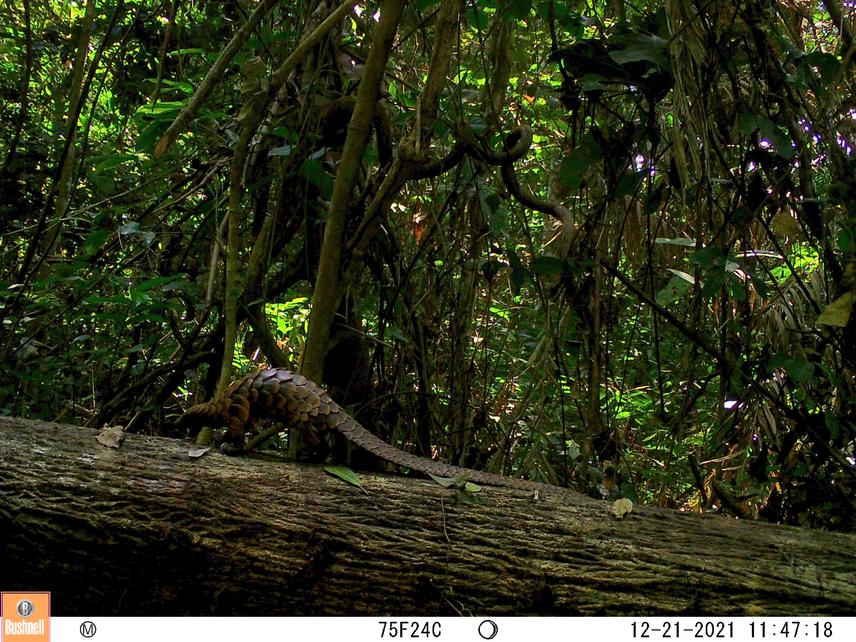Ghislain Difouo Fopa
Other projects
22 Jan 2019
Distribution, Habitat, and Food Preferences Assessment as Conservation Issue of Three Pangolins Species in Deng-Deng National Park (DDNP)
19 May 2020
Evaluation of the Impact of Anthropogenic Activities Threats on Pangolins Population in the Deng-Deng National Park (DDNP)-Cameroon
The pangolin populations in Deng Deng National Park face significant threats, including subsistence hunting, poaching for scales trafficking, and unsustainable forest resource exploitation. These activities, coupled with cattle transhumance and habitat degradation alongside climate change elevate the risk of extinction for these unique scaled mammal species (Challender & Hywood, 2012). Human impact has adversely affected the relative abundance of pangolins (Difouo, 2022). Conservation actions poorly identified, evaluated, and targeted specific threats affecting pangolin survival.

A black-bellied pangolin Phataginus tetradactyla photographed walking on a downed fallen-log in Deng Deng National Park, Cameroon ©Ghislain F. Difouo / Rufford Foundation/ University of Yaoundé 1
While research on pangolins’ ecology is available around protected areas (Ichu et al., 2017; Difouo et al., 2020; Mouafo et al., 2021; Simo et al., 2020, 2023a), standardized methods for monitoring black-bellied pangolin populations—critical for pangolin conservation—are lacking (Willcow et al., 2019). Effective monitoring is essential to detect changes in species status and inform conservation management (Chaudhary et al., 2022). Log-viewing camera traps have proven effective for white-bellied pangolins (Simo et al., 2020, 2023b), while burrow-targeted camera traps are recommended for giant pangolins (Mathews et al., 2023). Unfortunately, camera trapping and community-based approaches have yielded limited results, particularly for the elusive, black-bellied pangolin (Difouo et al., 2023). This diurnal, mostly arboreal species remains rarely recorded in Cameroon, where years of effort have led to just two photographic events of the black-bellied pangolin in its natural habitat (Difouo et al., 2023; Moppo D, Unpublished data, 2020). This project integrates ecological and socio-economic aspects to develop community-based conservation initiatives for pangolins and their habitats and bridge the data gap regarding their ecology. It also aims to tackle the unsustainable extraction of non-timber forest products in and around Deng Deng National Park (DDNP) while extending pangolin research efforts in southern Cameroon.
Our Objectives:
1. Enhancing Community-Based Conservation to support newly discovered populations of three pangolin species through livelihood and income-generating activities.
2. Addressing Critical Threats to mitigating threats previously identified, including long-term domestication of Africa pepper. Additionally, we encourage livestock production and identify other threats faced by the species in various protected areas.
3. Collecting Ethnozoological and Ecological Data: We will gather essential data to inform and engage local stakeholders, emphasizing conservation and effective management.
To achieve these goals, our approach involves two key steps: (1) We will conduct training sessions for local communities. Topics covered include sustainable resource use, forest protection, domestication, and restoration. (2) We plan to test two camera trap placement strategies to gather valuable ecological data on pangolins.